Posted by: Ken @ 9:33 am
We are now back in Illinois after an enjoyable South Central Alaska trip that included camping at Talkeetna, Denali National Park, Soldotna, Homer and Seward. We were accompanied by our two daughters and their families. Our older daughter had suggested an Alaska visit to celebrate a landmark birthday. She also wanted to compensate for her inability to join our 50th Wedding Anniversary family reunion last year, in Estes Park, Colorado. At that time, she and her husband had traveled up from Arizona as far as Colorado Springs, when they learned of the sudden tragic death of his younger brother. Of course, they turned back to be with his family.
We flew out of Chicago with our younger daughter, her husband and their two daughters, ages 6 and 7. The trip got off to an inauspicious start when we discovered that one of our 6 suitcases was never tagged by the curbside luggage check-in clerk. Happily, the crisis was resolved when the clerk found the missing item before flight time. For 10 nights, the six of us shared life in a 32 foot 2011 Winnebago RV.
Arriving in Anchorage late in the evening, we occupied the camper and spent our first night in the parking lot of the RV rental agency. On the next day we drove north about 125 miles to Talkeetna. It was not a birding trip per se, but our plans included wildlife cruises out of Homer and Seward. Mary Lou and I found limited time to look for land birds around the campgrounds.
Our older daughter and her husband had flown in earlier that day and picked up their RV in time to spend their first night at a campground in Denali State Park, and their second night inside Denali National Park. We would meet up with them at Denali on our third night out. Then, another crisis…
Deciding not to carry the extra weight of my notebook computer, I had prepared a detailed itinerary and scanned all the pertinent reservations and receipts, saving them as PDF files in my iPod Touch. Unfortunately, on our second night out, the iPod went dead as a stone after I attempted to charge it with a third-party AC charger. Luckily, I had also copied the entire travel folder into Dropbox, so I was able to read the files on Mary Lou’s laptop whenever we had a WiFi connection. However, such connections were usually non-existent or unreliable, and I will never again be so overly reliant on technology. The only field guide I had brought was the Sibley iPod app, and it was gone for the entire trip. Some of the birds I expected to see, especially pelagic species, would be new or unfamiliar, and this posed a challenge.
Talkeetna is a fairly isolated and quaint village on the Alaska Railroad that is a popular destination for touring companies. A 3/4 mile wooded trail follows along the rail line from our campsite northward to the bridge over the Talkeetna River.
Great Alaskan Railway train in Talkeetna Station, with the trail following along the tracks towards the river: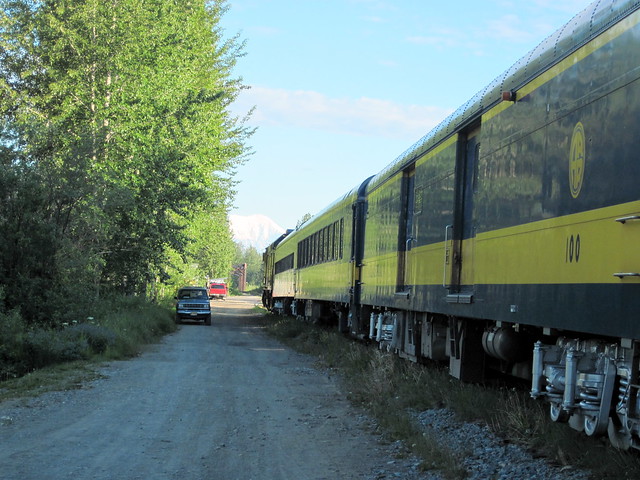
The trail provided us with a splendid view of the southern Denali mountain chain, about 50 miles to the north:
Next to the RV, a Pine Siskin foraged for seeds that appeared to have collected around a blue tarp:
White-crowned Sparrows were singing all around Talkeetna Camper Park…
…as were Dark-eyed (Slate-colored) Juncos:
Along the trail, I recognized the “FREE BEER!” call of Alder Flycatchers even without the assistance of a field guide. Most were hidden in the trees… 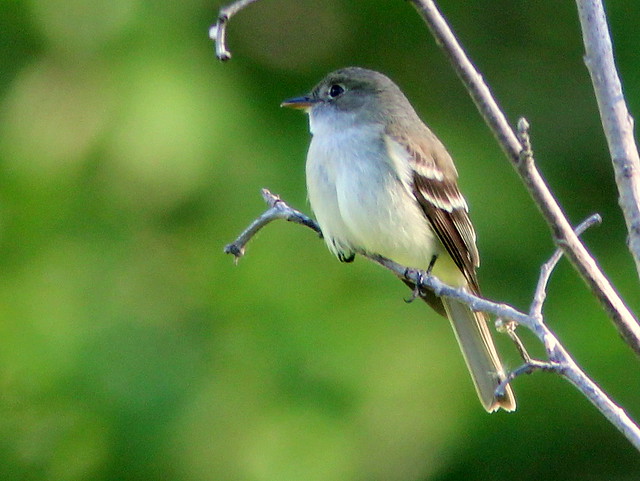
…but this Alder Flycatcher sang for me at eye level, clinching its identity as my first “Life Photograph” of the trip: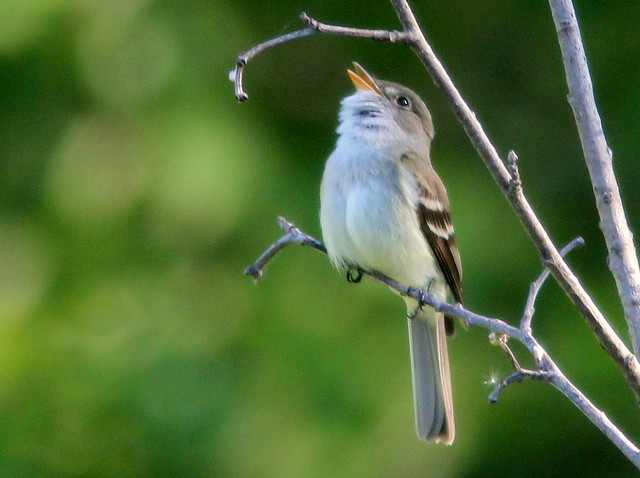
Birding presents many learning opportunities. I was surprised to find that the Yellow-rumped Warblers in Alaska have white throats and light breasts, indicative of the “Myrtle” subspecies of the eastern US; I had expected to see the yellow throat and black chest and upper breast of the “Audubon’s” race which is common in the western part of the lower 48 states
An Internet search revealed that the Audubon’s subspecies (Dendroica auduboni) developed rather recently, during the Pleistocene (10,000 to 20,000 years ago), when glaciation isolated the Myrtle (D. coronata) from the Mexican Black-fronted Warbler (D. nigrifrons). As the glaciers receded, the two populations interbred, and the Audubon’s form may have originated through hybridization between the Myrtle Warbler and the Mexican nigrifrons form (Wiki).
In 1973, on the basis of a limited area of hybridization between the two populations, the American Ornithologists’ Union reduced the number of species in my life list by “lumping” the Myrtle and Audubon’s forms of the Yellow-rumped Warbler into one species. Definition of a “species” is a muddy area, but why does AOU permit Blue-winged and Golden-winged Warblers to be considered as separate species when they hybridize quite freely over a more widespread range?
Recent studies [BRELSFORD, A., MILÁ, B. and IRWIN, D. E. (2011), Hybrid origin of Audubon’s warbler. Molecular Ecology, 20: 2380–2389] have shown the Audubon’s race to be the first visually distinct bird “species” to have hybrid origins. It shares genetic characteristics of both the Myrtle and the Black-fronted Warblers, the latter of which is the Mexican species. “call(ing) into question the validity of these two forms as full species.”
Note the white throat and relatively light breast of this Alaskan “Myrtle” Yellow-rumped Warbler: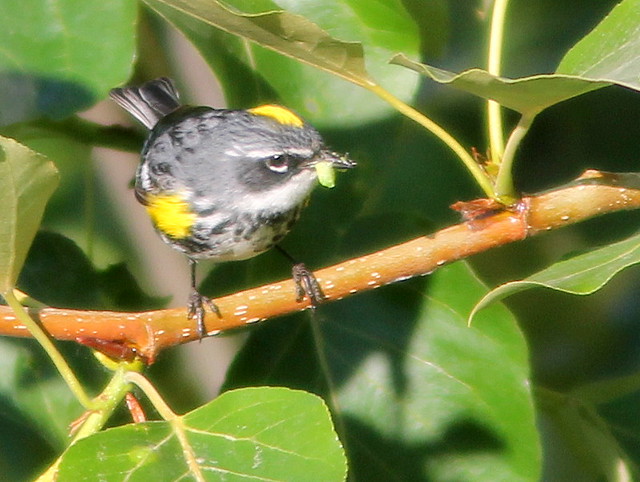
A fledgling Yellow-rumped Warbler waited to be fed:
The female Yellow-rumped Warbler that was feeding the fledgling had a very pale breast:
Violet-green Swallows were numerous; this one perched alongside the trail:
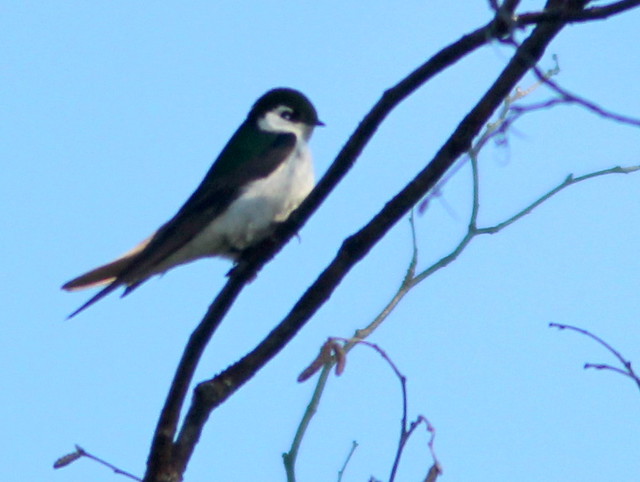
Feasting on dandelion seeds and nearly hidden in the gravel rail bed were Common Redpolls: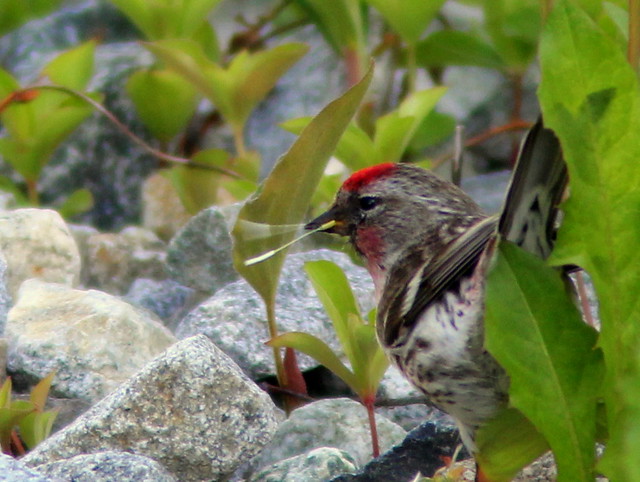
This redpoll perched on a dandelion flower stem:
A nearby fledgling looked like a baby redpoll. There were also Pine Siskins in the trees, so I could not rule out the latter species:
While watching the redpolls, we spotted a cow Moose with two calves along the railroad right-of-way:
We kept our distance as the twins approached us rather inquisitively, with their mother looking on:
I could not overlook the flowers, such as these Blue Bells:
Along the tracks, there were extensive beds of these little four-petaled white flowers of the Dwarf Dogwood:
Wild Irises were fairly common…
Our next stop: Denali National Park
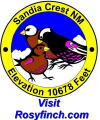




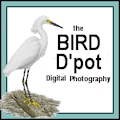

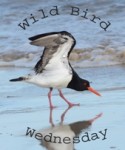







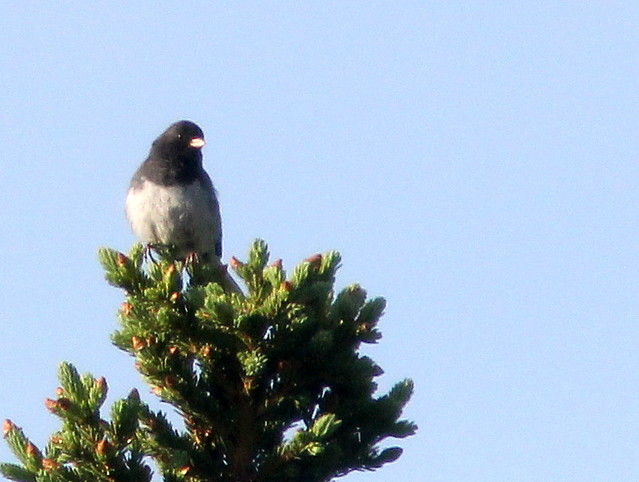
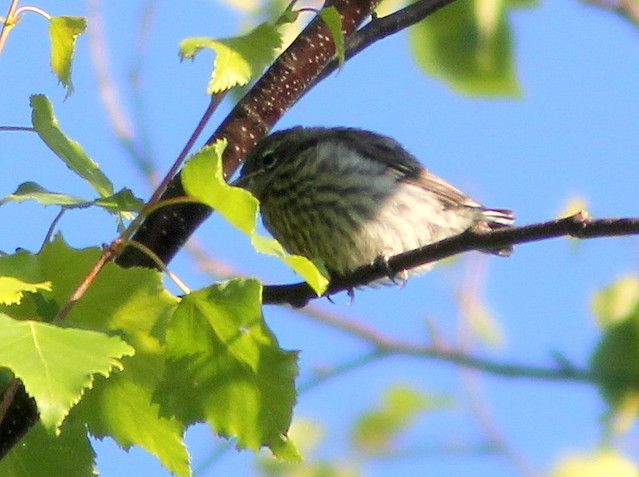

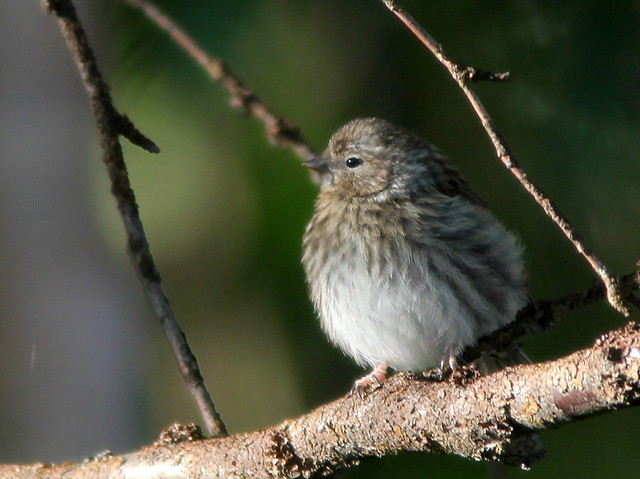
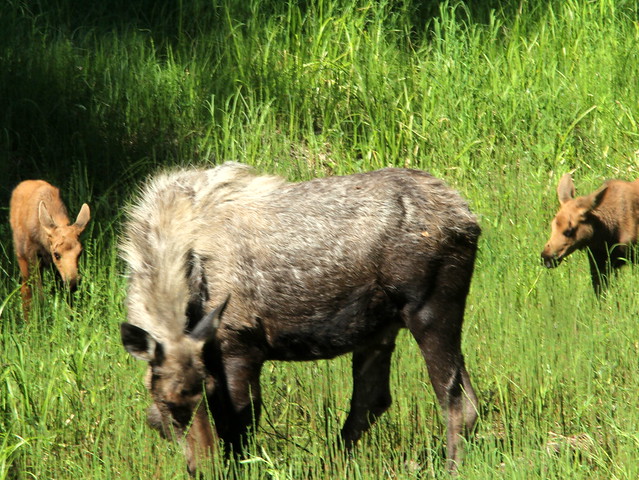



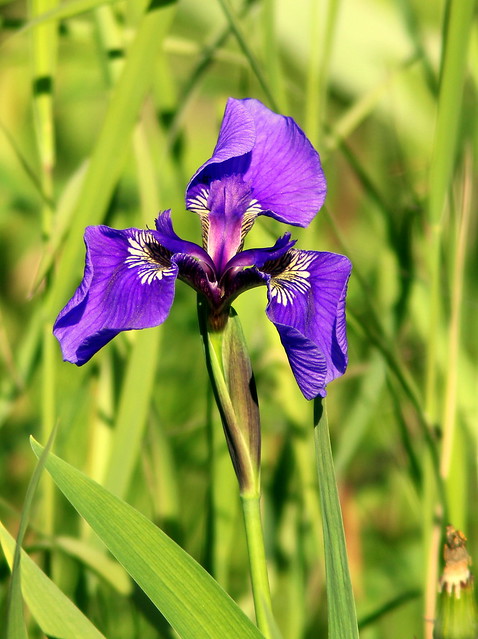
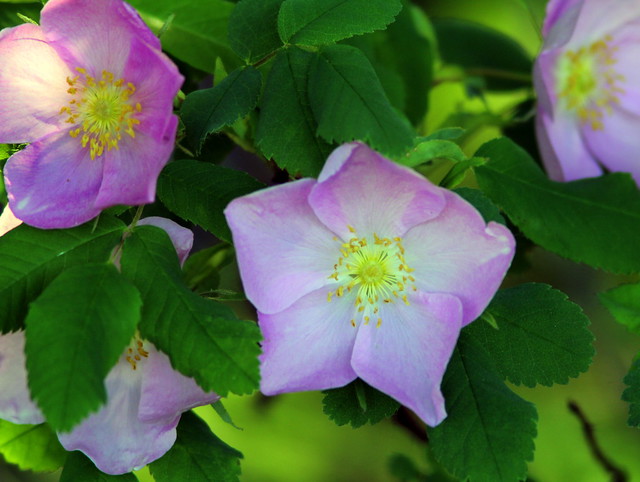
July 2nd, 2011 at 6:59 am Wonderful post on your Alaska trip. My favorite bird was the Redpoll. The scenery and the moose are awesome too. Great photos, have a wonderful holiday weekend.
July 4th, 2011 at 10:13 am Great photos, and it seems like you (mostly) had a good time. My iPhone died on me right when we moved to Virginia in December, and until I replaced it a month later, I felt somewhat crippled: I’ve come to depend on the thing too much. Best wishes for a happy Independence Day.
July 6th, 2011 at 3:22 am A lovely post to read, and your images are stunning. Beautiful landscape and wonderful wildlife. Many thanks for sharing. I have added the correct link to my website on this comment.
July 6th, 2011 at 6:46 am Enjoyed reading your post! Great writing and wonderful pix! Somewhere I heard that the AOU is going to separate the yellow-rumps again. It’s such a nuisance to always have to specify “Myrtle” or “Audubon”!
July 6th, 2011 at 7:44 am Absolutely stunning photos!! Boom & Gary of the Vermilon River, Canada.
July 6th, 2011 at 8:02 am No epic cross continent journey takes place without hardships, just ask Lewis and Clark! I’m sure all that took part in this trek will never forget it! These rich photographs you have treated us to are off the charts beautiful! You must be so pumped. The Redpoll on the dandelion is the best image of that bird that I’ve ever seen. What a post!
July 6th, 2011 at 9:50 am Fantastic post and images Ken! The pair of young Moose are adorable!
July 6th, 2011 at 10:17 am Wonderful photos, specially of the sparrow and flycatcher singing.
July 6th, 2011 at 3:09 pm Great photos and lovely birds. It sounds like a wonderful trip and very nice to have family with you.
July 6th, 2011 at 4:46 pm A fantastic variety Ken. I love the Moose twins; and the Iris is stunning.
July 7th, 2011 at 7:33 am Wonderful photos! Gorgeous scenery, many lovely birds, and that iris photo is spectacular!
July 7th, 2011 at 11:15 pm Awesome post Ken! I must agree with John that the moose calves are adorable and I think you made a very wise decision to not let them get too close with Mom there! But, I can’t get over those incredible shots of the Alder Flycatcher singing!! Fabulous!
November 26th, 2011 at 4:22 pm Fabulous photos of some lovely birds. The wildflowers are just gorgeous too, especially those Irises that grow wild. I just loved the twin Mooses!
November 27th, 2011 at 5:39 am Beautiful post! Love all your wonderful photos.
November 27th, 2011 at 6:42 pm Thank you, all, for your most encouraging comments!!
December 2nd, 2011 at 6:43 pm what a beautiful set of photos!